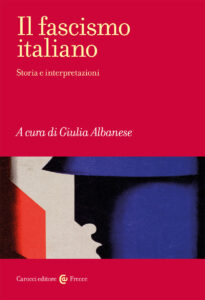Rethinking fascism / Il fascismo italiano
3 novembre 2022, ore 18
FacebookLive: https://www.facebook.com/INSMLI/live
Il fascismo italiano. Storia e interpretazioni
a cura di Giulia Albanese (Carocci 2022)
Rethinking Fascism. The Italian and German Dictatorships
a cura di Andrea Di Michele, Filippo Focardi (De Gruyter Oldenbourg 2022)
Lutz Klinkhammer (Deutsches Historisches Institut in Rom) dialoga con autori ed autrice.
 Negli ultimi anni la discussione sul fascismo è tornata al centro del dibattito pubblico con una rilevanza che non sarebbe stata pensabile all’inizio del nuovo millennio. A partire dalle domande emerse da tale rinnovato interesse storiografico, il libro racconta come il fascismo ha cambiato l’Italia, dando vita a un regime che si distingueva nelle forme e nelle ambizioni da altre esperienze del passato e contribuiva a trasformare nel profondo la politica contemporanea. I temi su cui si focalizza questa indagine sono la violenza, l’impero, la guerra, la politica, l’economia, la religione, la cultura, ma anche l’antifascismo, la propaganda, la vita quotidiana e l’impatto all’estero dell’esperienza fascista. Sono argomenti cruciali nella storia e nell’interpretazione del regime, qui indagati a partire da prospettive spesso inedite che, reinterrogando gli studi esistenti, avanzano letture originali e propongono nuovi interrogativi.
Negli ultimi anni la discussione sul fascismo è tornata al centro del dibattito pubblico con una rilevanza che non sarebbe stata pensabile all’inizio del nuovo millennio. A partire dalle domande emerse da tale rinnovato interesse storiografico, il libro racconta come il fascismo ha cambiato l’Italia, dando vita a un regime che si distingueva nelle forme e nelle ambizioni da altre esperienze del passato e contribuiva a trasformare nel profondo la politica contemporanea. I temi su cui si focalizza questa indagine sono la violenza, l’impero, la guerra, la politica, l’economia, la religione, la cultura, ma anche l’antifascismo, la propaganda, la vita quotidiana e l’impatto all’estero dell’esperienza fascista. Sono argomenti cruciali nella storia e nell’interpretazione del regime, qui indagati a partire da prospettive spesso inedite che, reinterrogando gli studi esistenti, avanzano letture originali e propongono nuovi interrogativi.
 This book takes up the stimuli of new international historiography, albeit focusing mainly on the two regimes that undoubtedly provided the model for Fascist movements in Europe, namely the Italian and the German. Starting with a historiographical assessment of the international situation, vis-à-vis studies on Fascism and National Socialism, and then concentrate on certain aspects that are essential to any study of the two dictatorships, namely the complex relationships with their respective societies, the figures of the two dictators and the role of violence. This volume reaches beyond the time-frame encompassing Fascism and National Socialism experiences, directing the attention also toward the period subsequent to their demise. This is done in two ways. On the one hand, examining the uncomfortable architectural legacy left by dictatorships to the democratic societies that came after the war. On the other hand, the book addresses an issue that is very much alive both in the strictly historiographical and political science debate, that is to say, to what extent can the label of Fascism be used to identify political phenomena of these current times, such as movements and parties of the so-called populist and souverainist right.
This book takes up the stimuli of new international historiography, albeit focusing mainly on the two regimes that undoubtedly provided the model for Fascist movements in Europe, namely the Italian and the German. Starting with a historiographical assessment of the international situation, vis-à-vis studies on Fascism and National Socialism, and then concentrate on certain aspects that are essential to any study of the two dictatorships, namely the complex relationships with their respective societies, the figures of the two dictators and the role of violence. This volume reaches beyond the time-frame encompassing Fascism and National Socialism experiences, directing the attention also toward the period subsequent to their demise. This is done in two ways. On the one hand, examining the uncomfortable architectural legacy left by dictatorships to the democratic societies that came after the war. On the other hand, the book addresses an issue that is very much alive both in the strictly historiographical and political science debate, that is to say, to what extent can the label of Fascism be used to identify political phenomena of these current times, such as movements and parties of the so-called populist and souverainist right.
Ciclo Autunno 2022
Data: giovedì 22 settembre
Volume: Daniele Stasi, Polonia restituta. Nazionalismo e riconquista della sovranità polacca, Bologna, il Mulino, 2022
Data: giovedì 6 ottobre
Volume: Daniele Marchesini, Stefano Pivato, Tifo. La passione sportiva in Italia, il Mulino 2022
Data: giovedì 3 novembre
Volumi:
Giulia Albanese (a cura di), Il fascismo italiano. Storia e interpretazioni, Carocci 2022
Andrea Di Michele, Filippo Focardi (a cura di), Rethinking Fascism. The Italian and German Dictatorships, De Gruyter Oldenbourg 2022
Data: giovedì 1 dicembre
Volume: Alessandro Stanziani, Le metamorfosi del lavoro coatto. Una storia globale, XVIII-XIX secolo, Bologna, il Mulino, 2022
